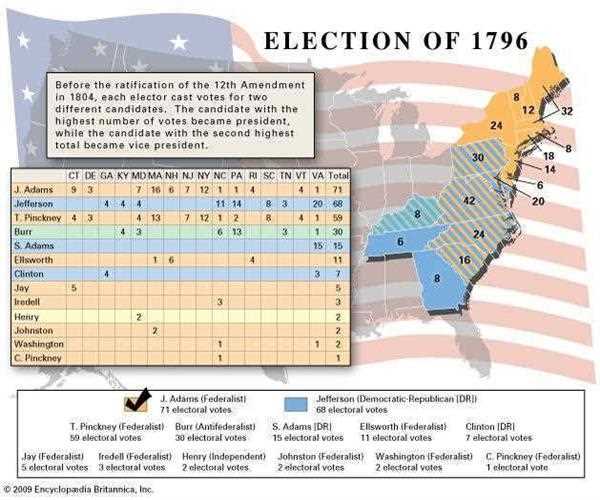The race of 1796 denoted the development of the political party framework in the United States. In the past races of 1789 and 1792, George Washington won consistent help with no gathering association, however finished the course of his administration a solid political partition had conformed to the financial approach of Alexander Hamilton. Hamilton and other people who supported a free elucidation of the Constitution and a solid focal government framed the Federalist Party in 1791.

Their adversaries, supporting a strict elucidation of the Constitution and states' rights, energized around Thomas Jefferson. In spite of the fact that Jefferson kept up that the gathering framework was ominous, he shaped his own gathering, later to end up known as the Democratic-Republican gathering.
Political issues in the 1790s started to be seen along these partisan divisions, and the fracture between the Federalists and the Democratic-Republicans was advanced by remote strategy debate.
In 1796, however there was not yet a reasonable method for choosing factional hopefuls, casual and undercover assemblies were held for the gatherings' congressional assignments to pick presidential and bad habit presidential candidates. The Democratic-Republicans picked Jefferson, and the Federalists designated Vice Pres. John Adams. Neither one of the parties could settle on a bad habit presidential competitor. At the time, notwithstanding, the Constitution—not hosting foreseen the ascent of the get-together framework—expressed that the applicant with the second most astounding aggregate of votes would move toward becoming VP.
Despite the fact that newness to challenged presidential races and the aberrance of the discretionary framework prompted low open intrigue, the race was nearly battled—to a limited extent in view of the quickly shaping gathering isolate. The outcome was a limited triumph for Adams, who conveyed 71 discretionary votes to Jefferson's 68. Adams cleared the upper east, while Jefferson won a great part of the south and west. Under the first constituent framework formulated under the Constitution (not changed until the Twelfth Amendment in 1804), Jefferson turned into Adams' VP—a circumstance that, inferable from their clashing political gatherings, demonstrated troublesome for the Adams organization.
"Cheers"